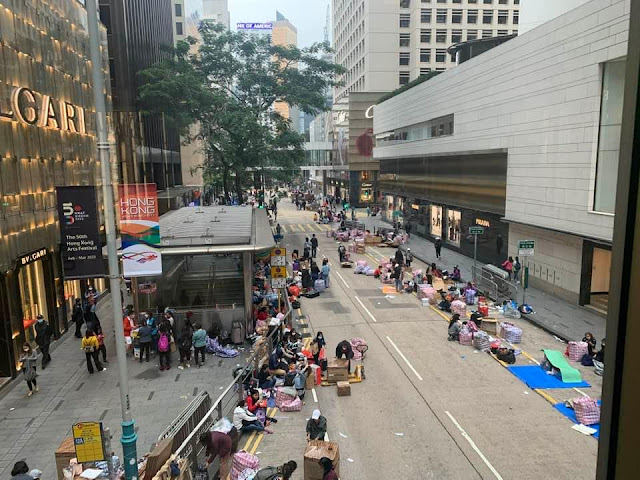By Daisy CL Mandap
 |
| Chater Road on Sunday remained busy though not as packed |
The leader of one of the biggest migrant groups in
Hong Kong has rebuffed renewed calls from the Labour Department for foreign
domestic workers to stay at home on their rest days due to the spread of the
Omicron variant in the community.
Dolores Balladares-Pelaez said today, Jan 9, that
migrant workers need their only day off in the week to relax and get away from
work pressure.
“Kailangan ng
holiday. Kailangan lang sundin ang mga (health) protocol, pero hindi dapat
maghigpit at gawing dahilan para hindi palabasin ang mga workers,” she
said.
 |
(We need our holiday. We just have to follow health
protocols, but there is be no reason why migrant workers should be prevented
from going out).
As she spoke, hundreds of FDWs, mostly Filipinos, went
about their usual business on Chater Road and nearby Statue Square, as well as
Edinburgh Place in Central. However, many nooks where workers would often hang
out in large numbers had been fenced off or barricaded.
 |
| Pindutin para sa detalye |
Once in a while, police officers accompanied by staff
of some government departments would pass by to check on workers grouped
together, but did not do more than remind some of them to stay in groups of
four, and keep their distance from each other.
 |
| Roving officers tell Chater habitues to follow social distancing rules |
A few workers could be seen with their masks lowered
down to their chin, but they were either ignored by the police, or were just lucky
to have escaped their attention.
However, migrant leaders who went about checking on
their members and reminding them to comply with the social distancing rules
reported seeing the police telling some workers not to eat together in public,
as this would entail them taking them off their masks, which is risky.
 |
| PINDUTIN PARA SA DETALYE |
In the morning, those who were squatting on the
underpass connecting Chater Road to City Hall were reportedly told to move to
other places. However, by the afternoon, the pedestrian walkway was turned into
one big hawkers’ market, with both sellers and buyers clogging the passageway.
But Pelaez said workers who hang out in the area are
generally well-behaved and mindful of the anti-gathering rules issued by the
government.
 |
| HOW? PINDUTIN ANG AD |
Their leaders also keep a watchful eye on them, well
aware that violators could be told outright to pay a fixed penalty of $5,000
each, or risk being prosecuted.
Pelaez said there is no evidence suggesting that
hanging out with their friends in open public spaces have caused FDWs to spread
the coronavirus among themselves.
 |
| CONTACT US! |
“Kahit sa
kanilang studies, hindi naman nakita na sa tambayan nakukuha ang impeksyon.
Doon din sa workplace nila nakukuha lagi,” she said. (Even the experts’
studies show that workers do not get infected in places where they hang out.
They usually get it in their workplaces).
 |
| Balladares-Pelaez says workers are often infected at their workplaces |
She was referring to the Indonesian domestic worker
who appears to have spread the virus to three fellow helpers during church
services, but was herself infected by her employer’s friend who visited them in
their house.
Pelaez said she understood that the house guest should
not be blamed for the cross-infection as
she was herself infected by her flight-attendant daughter, but the same thing
should apply to migrant workers.
 |
| PINDUTIN PARA SA DETALYE |
“Wala namang may
gusto nun,” she said. (Nobody wanted that to happen).
If restrictions are to be imposed on workers’
movements, the same should apply to employers, Pelaez said. For a start, they
should always be reminded not to invite too many people to their houses while
the dine-in ban is imposed, as this poses a high risk to their entire
household.
Such an advice would be timely, she said, with the
approach of the Lunar New Year holidays.
“Let’s celebrate with just the family to prevent any
cross infection,” Pelaez said.
 |
| PADALA NA! |













